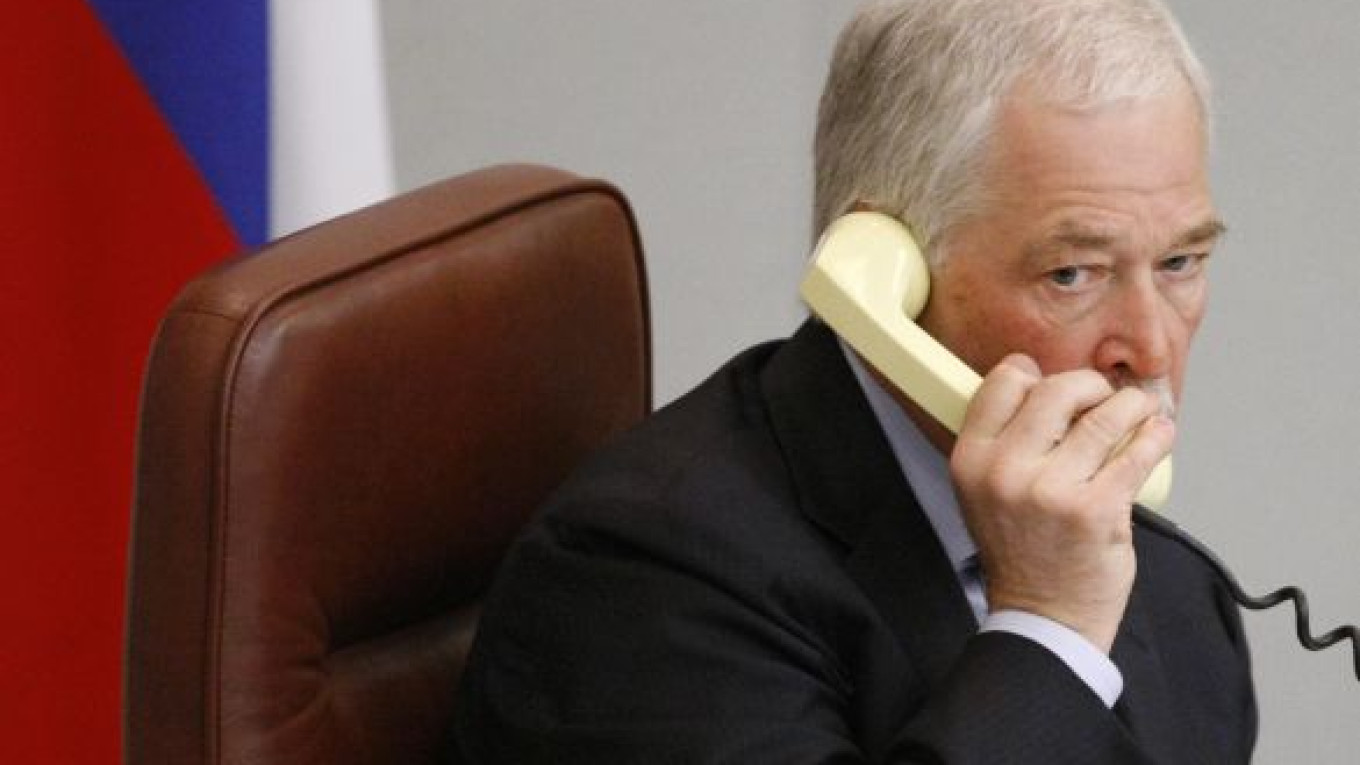Vedomosti on Tuesday sued State Duma Speaker Boris Gryzlov for accusing it of siding with Chechen rebels, marking the first time in at least a decade that a Russian newspaper has filed a defamation suit against such a high-ranking official.
Business News Media, Vedomosti's publisher, filed the defamation suit at the Moscow's Presnensky District Court, editor Tatyana Lysova and publisher Mikhail Doubik said in a joint statement published on the newspaper's web site.
Business News Media is a unit of Independent Media Sanoma Magazines, the parent company of The Moscow Times.
The newspaper is seeking an apology fr om Gryzlov — who also heads the ruling United Russia party's faction in the Duma — but no monetary compensation, said Vladimir Rumyantsev, a lawyer for Vedomosti.
The move comes almost four weeks after Gryzlov suggested that Vedomosti and the popular Moskovsky Komsomolets daily were in cahoots with Islamists responsible for the March 29 bombings in the Moscow metro that killed 40 people and wounded another 80.
The lawsuit could prove to be a high-stakes battleground for media freedom, as the government on Saturday submitted to the United Russia-dominated Duma a bill that would give the Federal Security Service the power to arrest or fine people and organizations that do not comply with officers' "legitimate demands."
Vedomosti wrote in an editorial Tuesday that the rules could be used to arrest journalists and editors who refuse to remove articles from their publications' web sites or otherwise fail to retract materials that the FSB feels threaten or undermine national security.
In a note accompanying the bill, the government wrote that the measures were needed to fight extremism and terrorism, noting that "some media outlets … propagate individualism, violence and mistrust of the state's capacity to protect its citizens."
Gryzlov said April 2 during a meeting between President Dmitry Medvedev and Duma faction leaders that two articles published March 30 — a day after the bombings — showed that the papers were siding with the terrorists.
"If we analyze these three sources, then we will see that in fact, they are stewing in the same juices. The connection between the publications and the terrorists' actions evokes suspicions," Gryzlov said.
He was referring to Vedomosti's analysis "Revenge for the Caucasus"? and an article by Moskovsky Komsomolets columnist Alexander Minkin. Both stories said the attacks were part of rebels' announced strategy to bring the war in the North Caucasus to the Russian heartland.
In a video released a day after the articles, Chechen rebel commander Doku Umarov claimed responsibility for the twin bombings and said they were meant to target Russian civilians in revenge for federal security forces' killings of Ingush and Chechen natives.
Vedomosti editor Lysova sent a letter to Gryzlov on April 6 asking him to explain his remarks or provide facts showing a connection between the paper's reporters and terrorist activity.
"If your remarks had an emotional nature and were not based on solid facts but resulted from a mistake or a confusion, then the editorial office of Vedomosti would want to receive apologies from you," the letter said, according to an excerpt published on the paper's web site.
Instead of an answer from Gryzlov, the paper received an offer to hear an official explanation from Yury Shuvalov, who is Gryzlov's top deputy in United Russia. Vedomosti was not satisfied with the response and decided to turn to the courts, the statement said.
Rumyantsev, the lawyer for Vedomosti, said Tuesday evening that the suit was filed at the Presnensky court in central Moscow because that is the district wh ere Gryzlov lives.
Moskovsky Komsomolets editor Pavel Gusev told The Moscow Times that Minkin had already sued Gryzlov as an individual and that the newspaper would support his suit.
Timur Prokopenko, a spokesman for Gryzlov, said he was aware of the case but declined further comment, saying has not received a copy of the complaint.
Media experts contacted for this article said they could not remember any such cases since Prime Minister Vladimir Putin ascended to the presidency in 2000.
As head of the lower house of the parliament, Gryzlov is the state's fourth-highest representative, following only President Dmitry Medvedev, Putin and Federation Council Speaker Sergei Mironov.
Andrei Richter, head of the Moscow Media Law and Policy Center, a media freedom watchdog, called the lawsuit "unprecedented." But for a paper like Vedomosti, the decision to go to court is natural, he said.
"Vedomosti is really concerned about its reputation, and any outcome will help to strengthen its credibility," he told The Moscow Times.
Although Gryzlov won a measure of support for his comments from Mironov, who heads the rival A Just Russia party and has clashed with Gryzlov in recent months, Medvedev played down the issue. Criticism from the media was "normal" after such an event, but journalists should not side with terrorists, Medvedev said at the time.
A Message from The Moscow Times:
Dear readers,
We are facing unprecedented challenges. Russia's Prosecutor General's Office has designated The Moscow Times as an "undesirable" organization, criminalizing our work and putting our staff at risk of prosecution. This follows our earlier unjust labeling as a "foreign agent."
These actions are direct attempts to silence independent journalism in Russia. The authorities claim our work "discredits the decisions of the Russian leadership." We see things differently: we strive to provide accurate, unbiased reporting on Russia.
We, the journalists of The Moscow Times, refuse to be silenced. But to continue our work, we need your help.
Your support, no matter how small, makes a world of difference. If you can, please support us monthly starting from just $2. It's quick to set up, and every contribution makes a significant impact.
By supporting The Moscow Times, you're defending open, independent journalism in the face of repression. Thank you for standing with us.
Remind me later.


